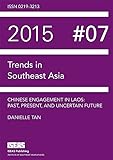Chinese Engagement in Laos : Past, Present, and Uncertain Future / Danielle Tan.
Material type: TextPublisher: Singapore : ISEAS Publishing, [2015]Copyright date: 2015Description: 1 online resource (32 p.)Content type:
TextPublisher: Singapore : ISEAS Publishing, [2015]Copyright date: 2015Description: 1 online resource (32 p.)Content type: - 9789814620888
- 9789814620895
- 337.510594 23/eng/20230216
- online - DeGruyter
| Item type | Current library | Call number | URL | Status | Notes | Barcode | |
|---|---|---|---|---|---|---|---|
 eBook
eBook
|
Biblioteca "Angelicum" Pont. Univ. S.Tommaso d'Aquino Nuvola online | online - DeGruyter (Browse shelf(Opens below)) | Online access | Not for loan (Accesso limitato) | Accesso per gli utenti autorizzati / Access for authorized users | (dgr)9789814620895 |
Frontmatter -- FOREWORD -- Chinese Engagement in Laos: Past, Present, and Uncertain Future -- INTRODUCTION -- THE CHINESE AND THEIR RECURRING ROLE AS MIDDLEMEN -- “TURNING LAND INTO CAPITAL” -- CONCLUSION -- REFERENCES
restricted access online access with authorization star
http://purl.org/coar/access_right/c_16ec
During the colonial period, Laos welcomed the smallest overseas Chinese communities in Southeast Asia, communities that almost disappeared after the communist forces seized power in Laos in 1975. Yet, this landlocked country shares a long history with China and even experienced a Golden Age thanks to the thriving caravan trade between Yunnan and mainland Southeast Asia. The Greater Mekong Subregion programme, launched by the ADB, has revitalized these historical trade routes, causing thousands of Chinese migrants to pour onto the new roads of Laos, channelled through the North-South Economic Corridor linking Kunming to Bangkok. The growing link between Laos and China has alarmed many scholars and development workers, both Lao and foreign; some even speak of a Chinese "shadow state" threatening Lao sovereignty and territorial integrity. It is necessary to go beyond the image of Laos regularly depicted as a weak state, a victim of globalization, and of China in particular, to consider a less passive posture. This paper argues that China's growing presence is far from eroding the power of the Lao communist regime. Instead, Chinese engagement allows the Lao state to cope with the challenges of globalization and to maintain its power at the same time. The paper will highlight Chinese engagement in Laos throughout history by emphasizing their recurrent patterns of intermediation. Then, it will describe how Chinese networks have become key partners of the Lao state's development policies. However, rising uncertainties over the neighbouring communist ally's economic potential may push China to revise its development strategy in Laos.
Mode of access: Internet via World Wide Web.
In English.
Description based on online resource; title from PDF title page (publisher's Web site, viewed 19. Oct 2024)


